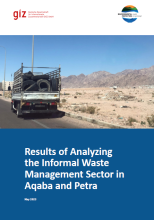Results of Analyzing the Informal Waste Management Sector in Aqaba and Petra

Jordan faces different environmental challenges resulting from the unsustainable production and consumption patterns in addition to the increase of waste, the loss of biodiversity, air contamination and deterioration of soil which lead to the pressure on the local environmental systems. According to a UN Development program in Jordan, the country produces 2.2 million tons of municipal solid waste annually. This number increases by 5% annually, whereas only 7% of the waste is recycled by the non-governmental sector.
Because of this, a study has been prepared for the global project “Environmental Protection Worldwide”, which is implemented by Deutsche Gesellschaft für Internationale Zusammenarbeit (GIZ) GmbH as part of the “Export Initiative Environmental Protection” on behalf of the German Federal Ministry for the Environment, Nature Conservation, Nuclear Safety and Consumer Protection (BMUV).
The study aims to understand the circumstances of the informal sector in both Aqaba and Petra cities as well as the circumstances of the personnel working in solid waste management facilities, where their operations are conducted side by side with the waste management sector.
The study included the review of the waste management situation in both Petra and Aqaba and the present situation of activities related to the collection, transport and landfilling of waste, the main landfills, the sector of the people working in the field of waste management and the non-official workers if available. The methodology also included field visits for a number of sites, as well as meetings with several officials in addition to the preparation of a questionnaire, which was distributed and filled during on site meetings.